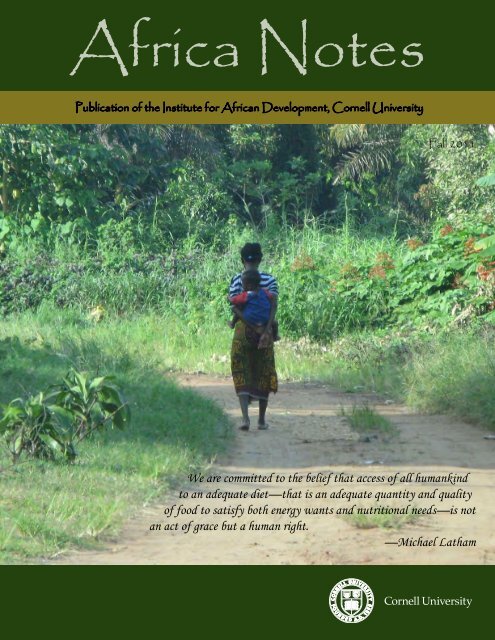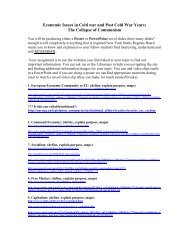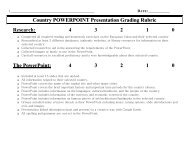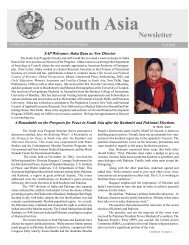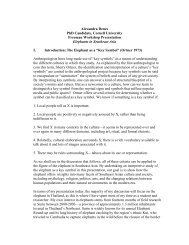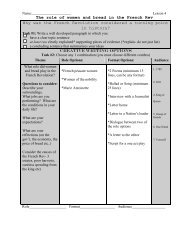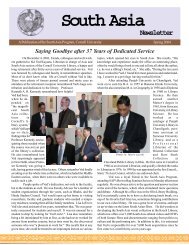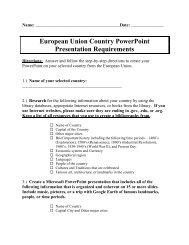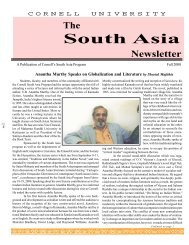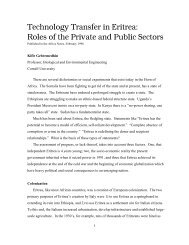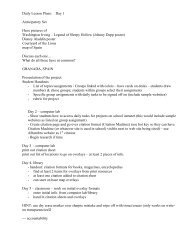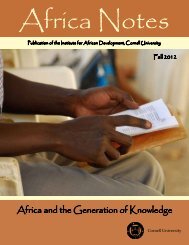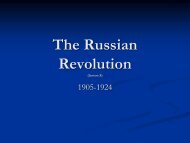Fall 2011 Africa Notes - Institute for African Development - Cornell ...
Fall 2011 Africa Notes - Institute for African Development - Cornell ...
Fall 2011 Africa Notes - Institute for African Development - Cornell ...
Create successful ePaper yourself
Turn your PDF publications into a flip-book with our unique Google optimized e-Paper software.
<strong>Africa</strong> <strong>Notes</strong>Publication of the <strong>Institute</strong> <strong>for</strong> <strong>Africa</strong>n <strong>Development</strong>, <strong>Cornell</strong> University<strong>Fall</strong> <strong>2011</strong>We are committed to the belief that access of all humankindto an adequate diet—that is an adequate quantity and qualityof food to satisfy both energy wants and nutritional needs—is notan act of grace but a human right.—Michael Latham
<strong>Africa</strong> <strong>Notes</strong> is published four times a yearby the <strong>Institute</strong> <strong>for</strong> <strong>Africa</strong>n <strong>Development</strong>,<strong>Cornell</strong> University.Contributions in the <strong>for</strong>m of articles,news items and comments are welcomefrom scholars, professors, <strong>Africa</strong>nists andorganizations. The <strong>Institute</strong> reserves theright to select or reject submissions or edit<strong>for</strong> available space. Contributions may besent via e-mail to CIAD@cornell.edu orby mail to:Editor, <strong>Africa</strong> <strong>Notes</strong><strong>Institute</strong> <strong>for</strong> <strong>Africa</strong>n <strong>Development</strong>164 Uris Hall<strong>Cornell</strong> UniversityIthaca, NY 14853tel: (607) 255-6849/5499fax: (607) 254-5000e-mail: CIAD@cornell.edu /jsb25@cornell.eduAll rights reserved. Materials from thisnewsletter may be reproduced <strong>for</strong> academicuse only. All references or excerpts fromthis newsletter must give attribution to the<strong>Institute</strong> <strong>for</strong> <strong>Africa</strong>n <strong>Development</strong>, <strong>Cornell</strong>Unversity. All other uses must have authorizationof the <strong>Institute</strong>.Jackie Sayegh, EditorEvangeline Ray, Assistant EditorContentsIn Memory of Michael Latham .......................................1Tribute to Michael Latham ..............................................2Infant Feeding and Breastfeeding.......................... 3Advocacy <strong>for</strong> Nutrition: Human Rights, Globalizationand the Politics of Hunger ..............................................5Advocacy from the Pulpit: No Man Is an Island ............7Breastfeeding: A Human Right ......................................9<strong>Africa</strong>n Solutions to <strong>Africa</strong>n Problems ........................ 12Distinguished <strong>Africa</strong>nist ScholarSandra Liebenberg............................................... 13After Independence, What Next <strong>for</strong> South Sudan? ..... 14IAD Fellow Profiles ..................................................... 16Humphrey Fellows ....................................................... 17<strong>Fall</strong> Seminar Series: Consolidation of Democracyin <strong>Africa</strong>............................................................... 18Spring Symposium: Elections, Accountability andDemocratic Governance in <strong>Africa</strong>....................... 21
In Memory of Michael Latham, 1929–<strong>2011</strong>This issue of <strong>Africa</strong> <strong>Notes</strong>is dedicated to the memoryof our friend and colleagueof many years, MichaelLatham, M.D., professor emeritusand graduate school professor ofnutritional sciences at <strong>Cornell</strong> University.Professor Latham was a member of the IADAdvisory board and an ardent supporterof the <strong>Institute</strong>. He was an exceptionalcolleague whose advice and intellectualhonesty was a constant inspiration to usall. His dedication to <strong>Africa</strong>n developmentwas unparalleled. This is a great loss to the<strong>Cornell</strong> Community in general and to theIAD family in particular. His indomitable spirit strengthenedand enlightened us all and left a lasting imprint on our lives.Our only consolation is that his contributions to <strong>Cornell</strong> and<strong>Africa</strong>n development have laid a solid foundation <strong>for</strong> thosepursuing research in <strong>Africa</strong>, especially research relating tonutrition and the welfare of children.Michael Latham was born in Tanzania and studiedmedicine at Trinity College in Dublin. He later receiveda degree in tropical medicine and hygiene from LondonUniversity and a master‘s in public health from HarvardUniversity. From 1955 to 1964 he occupied several positionsin the Tanzania medical services. He was district medicalofficer and director of the nutrition unit of the Ministry ofHealth in Tanzania. In recognition of hisoutstanding and invaluable service, QueenElizabeth II awarded him the Order of theBritish Empire (OBE) in 1956 <strong>for</strong> his workon developing the nutrition unit. Theaward also recognized his leadership inestablishing the International School, anintegrated primary school in Dar es Salaam.Professor Latham joined the <strong>Cornell</strong> facultyin 1968 after four years at Harvard and laterserved as director of <strong>Cornell</strong>’s Program inInternational Nutrition <strong>for</strong> 25 years.He was “internationally recognized <strong>for</strong>his expertise in the major nutritional problemsof developing countries. In research,teaching and public service he has beenparticularly involved with breastfeeding,infant and child health; parasitic infectionsand their relationship to health; micronutrient deficiencies,especially iron deficiency anemia and vitamin A deficiency;and nutrition and human rights” (<strong>Cornell</strong> Chronicle, 2008).An expert in international nutrition and tropical publichealth, Professor Latham has authored more than 350 journalarticles as well as several books. His books include: KilimanjaroTales: The Saga of a Medical Family in <strong>Africa</strong>; Human Nutrition inTropical <strong>Africa</strong>; and Human Nutrition in the Developing World.He has left a great void in the nutrition community towhich he so brilliantly and generously gave his time andenergy, as well as in the IAD community, which he servedwith dedication, diligence, and humility.He will be sorely missed by all of us. Safari njema, rafikiwangu (Travel well, good friend).To honor Michael’s work, in this issue we have reprinted excerpts from the online collection,Five Decades of International Nutrition Research and Advocacy Conducted byProfessor Michael Latham and his <strong>Cornell</strong> University Colleagues and Students(2008). The collection was edited by Micheline Beaudry, Suzanne Gervais and Michael Latham and includescontributions by Andrea Gaul, Julie Grimaldi, Kathy Huong, Antony Kironji, Jeanne Lawless, Kathryn Mosso,Jiang Tian, Yuliya Tipograf, and Betsy Wonderly. Excerpts from the following articles are included:Infant Feeding and BreastfeedingAdvocacy <strong>for</strong> Nutrition: Human Rights, Globalization and the Politics of HungerBreastfeeding: A Human RightAdvocacy from the Pulpit: No Man Is an Island**excerpts from Michael’s 1981 sermon delivered from the pulpit of Sage Chapel on the <strong>Cornell</strong> Campus<strong>Fall</strong> <strong>2011</strong><strong>Africa</strong> <strong>Notes</strong>1
Tribute to Michael LathamRemarks delivered by Professor Muna Ndulo at a Memorial Service held <strong>for</strong> Michael Lathamat Sage Chapel, <strong>Cornell</strong> University, Sunday, July 3, <strong>2011</strong>It is a great honor <strong>for</strong> me to pay tribute to the extraordinarylife of Michael Latham. Throughout his life, Michaelfought hard and courageously <strong>for</strong> the things he believedin. A faithful servant of his continent <strong>Africa</strong> and his countryTanzania, a noble and modest trailblazer in the fight<strong>for</strong> the health and well-being of all people—but especiallychildren, and a trusted and loyal friend to those who knewand loved him, Michael lived a good life that will not soonbe <strong>for</strong>gotten.There are moments when one is rendered numb andspeechless by received news—news that is so grievous thatall thought momentarily ceases and speech is silenced. Thatis what happened to me when I heard of the passing of mydear friend and colleague. His death brought to mind a passagefrom a poem by William Wordsworth:A gem that glitters while it lives,And no <strong>for</strong>ewarning gives;But, at the touch of wrong, without a strifeSlips in a moment out of life.Service is the rent we pay <strong>for</strong> living on this earth, andMichael paid his above and beyond what was expected ofhim. He illuminated by his knowledge and by his militancythe work that many do today in the field of children’s nutritionand infant mortality. In evoking his name, we see theman in the village, we see him fighting the battle to ensurethat the poorest should have access to health care and nutritionto enable them to live full and productive lives. Michaelalways looked truth in the face and stated it clearly andcalmly, without excess. He was an example of hard workand dedication.I met Michael in 1996, at a symposium organized by IAD.I was immediately struck by his passion <strong>for</strong> developmentand concern <strong>for</strong> the plight of others. Our friendship andinteractions grew over the years. In his very quiet way, hetold me that he was ready, able, and willing to assist me asdirector of the <strong>Institute</strong> in any way he could to work towards<strong>Africa</strong>n development. Over the years, he did exactly that. Hewas immensely proud of our work at IAD, coming always toseminars when his schedule permitted. In one of his e-mailswhile in Florida this year awaiting surgery, he requested additionaltime to submit the article he had graciously agreedto write <strong>for</strong> the IAD news journal, <strong>Africa</strong> <strong>Notes</strong>. He also askedhow the weekly seminars were going.As a member of the <strong>Institute</strong> Advisory Board, Michaelwas the first to comment on seminar topics or to make suggestions<strong>for</strong> improving programs. He never missed an IADAdvisory meeting. In fact, one of his last e-mails to me wasabout how he regretted that he would miss the upcomingmeeting because of his surgery. My last communication fromhim was sent by Suzanne Gervais the week that he died. It read:1See page 6 <strong>for</strong> more in<strong>for</strong>mation.I am writing on behalf of Professor Michael Latham, who is currently[a patient] at the Massachusetts General Hospital in Boston.Michael wanted you to [know] that he has been unable to followup with his e-mail and will not be able <strong>for</strong> some undeterminedtime. He will want to resume his activities with IAD as soon as herecovers. Sadly, this was not to be.Michael and I spoke about many things, and I looked<strong>for</strong>ward to our talks. It was always heartwarming to seehim, his smile, and to know that here was someone who wascompletely genuine, an extraordinary human being, a warmfriend, and a person who asks nothing in return.One of the most enduring memories I have of Michaelwas his commitment to equality and the well-being of others.He had a profound understanding of the essential equalityof all people and the ability of people everywhere to engagein conduct which was both good and evil. He contributedgreatly to the well-being of others and championed nutritioncauses <strong>for</strong> children through moral, intellectual and practicalsupport. His conviction was that governments had to be madeto understand the importance of nutrition and health to theadvancement and continued moral and economic growth oftheir countries.With Michael’s passing the entire world community ofdevelopment scholars, nutritionists and activists mourns theloss of a visionary, a humanist and an activist scholar whosework and ideals have influenced and will continue to influencegenerations of scholars. The Latham family has lost ahusband and a father. <strong>Africa</strong> has lost a devoted and dedicatedcitizen, the world has lost a gentle fighter <strong>for</strong> the well-beingof its people, activists throughout the world have lost an allyand a dedicated and courageous man. IAD, <strong>Cornell</strong>, and thecommunity of scholars have lost a remarkable and acclaimedprofessor, and we have all lost a mentor, teacher, and friend.Michael’s dedication and devotion to academia and to theservice of mankind was unequalled.In recognition of his work and in his honor the <strong>Institute</strong><strong>for</strong> <strong>Africa</strong>n <strong>Development</strong> has established the Michael LathamTravel Grant 1 to fund student participation in academic conferences.We feel this is a fitting tribute <strong>for</strong> a man who wasso passionate about his students.But the best tribute we can render Michael is to be faithfulto his work. I would like to end by quoting <strong>Africa</strong>nauthor Birago Diop, <strong>for</strong> Michael was an <strong>Africa</strong>n at heart anda Tanzanian by birth. Diop says, “Listen more to the voice ofthings than to the voice of creatures, because the dead are not dead,they are in the dormant water, they are in the water that sings, theyare in the water that cries.” I would say Michael is not dead. Heis the voice of anonymous community workers and scholaractivists working day and night to alleviate the horrors ofpoverty, disease and hunger throughout the world. May hissoul rest in peace.2 <strong>Africa</strong> <strong>Notes</strong><strong>Fall</strong> <strong>2011</strong>
Infant Feeding and BreastfeedingFrom Five Decades of International Nutrition Research and Advocacy 1<strong>Africa</strong> ForumDuring most of his professionalcareer Michael Latham was astrong advocate <strong>for</strong> breastfeedingand an aggressive opponent of thepromotion of infant <strong>for</strong>mula. Perhapsthe first published record of that canbe found in a keynote address he gave48 years ago at the Sixth InternationalCongress of Nutrition in Edinburgh in1963. He stated:A new and serious problem which hasbeen introduced to Tanganyika is perniciousadvertising [of infant <strong>for</strong>mula]. Among themajority of people in Tanganyika the commencementof bottle-feeding is tantamountto signing the death certificate of the infant.I would reiterate that anything that can bedone to support breastfeeding is desirable(Latham, 1963).When this was written, only a tinyminority of infants in the U.S. wereever breastfed, and breastfeeding wasdeclining worldwide. Michael was thenworking in Tanganyika (now Tanzania)as director of the Nutrition Unit of theMinistry of Health. He was among avery few professionals who recognizedthis problem. Others speaking out wereDick and Patrice Jelliffe, then workingin neighboring Uganda, and CicelyWilliams in Lebanon. After his move tothe U.S., Michael became a prominentfigure in the international and U.S. Nestléboycott. The Nestlé Corporation was theleading exporter of infant <strong>for</strong>mula tonon-industrialized countries and spentmillions of dollars annually in aggressivemarketing, hooking mothers andbabies onto artificial feeding. This led toa huge worldwide campaign to boycottall Nestlé products until the companymodified its aggressive marketing. In1978, the National Council of Churchesheld a meeting in New York to considerwhether the churches should endorseand support the boycott. INFACT, theboycott organizers, chose Michael tobe their one permitted spokesman.After his address, Nestlé vice presidentErnest Saunders was given equal timeto respond. The bishops and Councilmembers then voted overwhelmingly tosupport the boycott. Michael’s presentation,“The Case against Nestlé,” was laterpublished by INFACT and received widedistribution (Latham, 1978).Beginning in 1968, Michael, withhis colleagues and many graduatestudents, conducted a great deal of researchon infant feeding and publishedmany research and advocacy papersand monographs. A major five-yearUSAID-funded study on infant feedingbegan in 1980 to investigate the causesand consequences of mother’s choiceswith regard to infant feeding in fourlarge cities of four countries: Nairobi inKenya, Bangkok in Thailand, Semarangin Indonesia, and Bogota in Colombia.This study had three principal investigators:Dr. Beverly Winikoff fromthe Population Council in New York,Dr. Giorgio Solimano from ColumbiaUniversity, and Dr. Michael Lathamfrom <strong>Cornell</strong> University. A broad rangeof other studies was also conducted, <strong>for</strong>example by Stina Almroth in Jamaicaand Lesotho, by Ted Greiner in St.Vincent and Yemen, by Terry Elliotand Penny van Esterik in Kenya, byCarolyn Campbell in Mexico, by ZeinabSayed in the Sudan, and by Judy Pojdain Belize.Between 1975 and 1982, Michaelwas series editor of six lengthy <strong>Cornell</strong>international nutrition monographs oninfant feeding, and many members ofthe <strong>Cornell</strong> group served as authors.They presented research findings onsuch topics as the economic value ofbreastmilk, the influence of breastfeedingon fertility, and the role of Nestléin the decline of breastfeeding. Overall these years, Michael continued tobe a strong advocate <strong>for</strong> breastfeedingand worked to reduce what he saw asthe unethical promotion of breastmilksubstitutes. Michael also played asignificant role in the development ofthe International Code of Marketingof Breast-milk Substitutes (the Code,often termed the “WHO Code”); hetook a leading role in the founding ofthe World Alliance <strong>for</strong> BreastfeedingAction (WABA), becoming Co-Chair oftheir International Advisory Council;and he wrote extensively on infants’breastfeeding rights. In recent years hewas in the <strong>for</strong>efront of the debates on optimalfeeding <strong>for</strong> infants born to womenpositive <strong>for</strong> HIV. This work included afour-country study (Kenya, Botswana,Uganda, and Namibia) <strong>for</strong> UNICEF,conducted with Pauline Kisanga ofthe International Baby Food ActionNetwork (IBFAN-<strong>Africa</strong>), to determinethe impact of the HIV/AIDS pandemicon breastfeeding in sub-Saharan <strong>Africa</strong>(Latham and Kisanga, 2001).The case against NestléFollowing is an excerpt fromMichael’s 1978 presentation to theGoverning Board of the NationalCouncil of Churches in New York—thepresentation that led to the Council’ssupport of the Nestle boycott, andthere<strong>for</strong>e support <strong>for</strong> breastfeeding. Thisillustrates Michael’s view:I feel deeply moved and honored to havethe opportunity to talk to the Board of theNational Council of Churches today. I am1Five Decades of International Nutrition Research and Advocacy Conducted by Professor Michael Latham and his <strong>Cornell</strong> University Colleaguesand Students, World Public Health Nutrition Association, 2008. Available online at:http://www.wphna.org/downloadsmay<strong>2011</strong>/Latham%20monograph%205%20decades%20of%20research.pdf<strong>Fall</strong> <strong>2011</strong><strong>Africa</strong> <strong>Notes</strong>3
Advocacy from the Pulpit 1“No man Is an Island”There is always a temptation <strong>for</strong> us to be satisfied with small steps when giantstrides are needed. We require more than palliatives and tranquilizers. BishopTutu of South <strong>Africa</strong> said recently about his oppressed black majority, ‘We donot want our chains made more com<strong>for</strong>table, we want them removed.’On March 15, 1981, at the requestof the Reverend Jack Lewis,then Director of <strong>Cornell</strong> UnitedReligious Work, Michael Latham gavethe weekly Sunday sermon in SageChapel at <strong>Cornell</strong>. The address, whichwas subsequently published (Latham,1981), was filled with advocacy andconcern <strong>for</strong> the underprivileged in theworld. Michael opened his remarkswith a 1624 quote from the Englishphilosopher, sermonizer and poet JohnDonne:No man is an Island, entire of itself;every man is a piece of the Continent; if aclod be washed away by the sea, Europe isthe less, as well as if a promontory were, aswell as if a manor of thy friends or of theirown were; any man’s death diminishes me,because I am involved in Mankind; andthere<strong>for</strong>e never send to know <strong>for</strong> whom thebell tolls; it tolls <strong>for</strong> thee….Michael went on to state:The reading from John Donne was chosenbecause it suggests we live in one world, andthat all persons who inhabit it are related andplay a role in its destiny. I believe also thatmost of the people in the world are moral,loving and humane. Although the worldbasically is a good place, it is today plaguedby poverty, disease, and suffering—and yetthis need not be. Human actions are at theroot of most of the inequity and injustice;and human decisions could change the worldinto a better place.If this is to happen there has to be firsta better understanding between peoples andsecond a revolutionary change in attitudesand policies. Without revolutionary changesin our thinking, in our institutions, in therelationships between rich and poor, thereis little hope—hope either <strong>for</strong> the rich or thepoor, peoples or nations.In 1981 we have to be concerned about theenormous ignorance that the United Stateshas about the developing world, wherein livethe majority of mankind. Our governmentand our people appear to fail to understandthat the problems of poverty, inequity andinjustice in the world are of vital interestto us. A good future <strong>for</strong> us does not lie ina retreat into either a new militarism orneo-isolationism. As John Donne said, noman is an island, and figuratively no nationis either.There is always a temptation <strong>for</strong> us tobe satisfied with small steps when giantstrides are needed. We require more thanpalliatives and tranquilizers. Bishop Tutuof South <strong>Africa</strong> said recently about his oppressedblack majority, “We do not wantour chains made more com<strong>for</strong>table, we wantthem removed.”One of the readings prior to thesermon that morning was from FatherDan Berrigan’s writings. Dan, a friendof Michael and <strong>for</strong>merly a Catholicchaplain at <strong>Cornell</strong> University, was arrestedand imprisoned several times <strong>for</strong>“illegal” acts against nuclear weapons inthe United States. Michael’s sermon andpaper (Latham, 1981) went on to statethat some seek revolutionary changethrough the use of arms but:I much prefer to see change soughtthrough peaceful revolutions. MahatmaGandhi’s approach of non-violence is myideal. But each human chooses his own weapons.Where are the lines to be drawn? WasDaniel Berrigan’s latest act violent or nonviolent?Military hardware was destroyedbut no life was endangered. The destructionwas surely symbolic. Dan Berrigan, <strong>for</strong>merchaplain of this university, has tried tomake the world a better place <strong>for</strong> all people.He has chosen his own means. Our firstreading taken from his writings suggeststhat he sees some Christian qualities in thebirds of the sky, and many non-Christianacts perpetrated by humans, some of themprofessed Christians.But our press seems to condemn revolutionaryviolence while condoning institutionalizedviolence. The use of <strong>for</strong>ce by theoppressed against their oppressors seemsto be the object of condemnation, whilerepression of society by recognized governmentsor by transnational corporations goesuncriticized. And meanwhile institutionalizedviolence continues. We need to considerhow current institutions, supported by ourgovernments, our press, even our churches,our universities and ourselves contributeto poverty, to ill health and to preventabledeaths. This different kind of violence is oftenfar more devastating, the carnage is muchgreater—and usually the victims are thosewho are innocent, who are not involved, andwho cannot defend themselves.In recent years there have been severalreports that look at our world in the year 2000and beyond and predict what it will be like.Most of these reports make depressing reading,because the prospects do not look good.The world will be more crowded and more1Reprinted from Five Decades of International Nutrition Research and Advocacy Conducted by Professor Michael Latham and his <strong>Cornell</strong>University Colleagues and Students, World Public Health Nutrition Association, 2008. Available online at:http://www.wphna.org/downloadsmay<strong>2011</strong>/Latham%20monograph%205%20decades%20of%20research.pdf<strong>Fall</strong> <strong>2011</strong><strong>Africa</strong> <strong>Notes</strong>7
infants do not get breastfed, and that mothersare influenced not to breastfeed theirnewborn babies, is a distortion of nature…and that breastfeeding in some countriesbecame a minority, not a majority, way ofinfant feeding is aberrant.These are the concluding paragraphsof the article:“Human rights” are sometimes termedentitlements. Internationally they includerecognition of certain items or <strong>for</strong>ms of treatmentthat all persons deserve or to whichthey are entitled. It is then expected thatsocieties will take steps to ensure that theirmembers enjoy these rights or entitlements.This may be achieved in part by nationallegislation and national actions. But inthe end it takes people and communities toensure compliance and to take action to helpall enjoy their rights. The assumption is thatall members of a community deserve at leastcertain minimal rights.Certain basic rights have been includedin international declarations, have beenpromulgated by authoritative internationalbodies as codes or standards <strong>for</strong> all societiesor all nations, or have been incorporated innational constitutions. Some of these rights,ranging from the 1948 Universal Declarationof Human Rights to the 1989 Convention onthe Rights of the Child, have been outlinedin the introduction to this paper. These andmany other international documents establishhuman beings’ rights to health and tofood, and even to good nutrition. If we acceptthese rights, then this paper argues that it islogical that mothers have rights to breastfeed.Breastmilk is the only ideal food to ensurethe good health, proper development, andwell-being of young infants. Breastfeedingalso contributes to women’s health.This logic then leads to acceptance thatany obstacles to breastfeeding are infringementsof human rights. Major negativeinfluences on breastfeeding there<strong>for</strong>e contributeto loss of this human right, and anypersons who place obstacles in the way ofbreastfeeding are parties to infringementsof human rights.Major negative influences on breastfeedinginclude: 1) the health profession,hospital practices, and the medicalizationof infant feeding; 2) the promotional andmarketing practices of manufacturers ofbreastmilk substitutes; 3) failure of nationsand communities to assist mothers to bothbreastfeed and work away from home; and4) lack of community support <strong>for</strong> mothersto initiate, sustain, and maintain optimumbreastfeeding.The contention here is that mothers havea human right to breastfeed their infants, andthat obstacles to this are infringements onthis right. As with other rights, states haveobligations to respect, protect, facilitate,and fulfill this right. The WHO/UNICEFInnocenti Declaration on the Protection,Promotion and Support of Breastfeeding(WHO/UNICEF, 1990) provides a usefulframework <strong>for</strong> nations to honour theseobligations.This paper does not discuss in detail thepossible tensions between infants’ rights tobe breastfed and mothers’ rights to choosenot to breastfeed. It is certainly not proposedthat mothers who choose not to breastfeedtheir infants should be penalized, ridiculed,or prosecuted. Mothers need to have thefreedom to choose how to feed their babies.But it is argued here that almost all mothersliving under optimally baby-friendly conditionswould make the choice to breastfeed.This is shown in countries as diverse asNorway and Tanzania. There<strong>for</strong>e, what isneeded is action to remove those obstacles tobreastfeeding, many of which are discussedin this paper. In some countries, such as theUnited States, a major obstacle is the lack ofknowledge that there is no good alternativeto breastfeeding.The argument made is that mothers havea legal right to breastfeed their babies if theychose to do so. Infants’ interests in optimalhealth and nutrition may be jeopardized ifnot fed on human breastmilk, or even if notbreastfed. This should be viewed in terms ofethical, moral or civic interests and duties, notas legal obligations on the mother derivingfrom legal rights of the infant.We should help mothers understandthe benefits of breastfeeding to themselvesand their infants. We can then agree thatstates have responsibilities and obligationsto respect, protect, support and promotethe removal of all obstacles to breastfeeding.When this is achieved, it probably willbe unusual <strong>for</strong> infants not to be breastfed(Latham, 1997).Infant Feeding and Breastfeedingcontinued from page 4<strong>for</strong> full-term infants” and goes on to say that“ideally breast milk should be practically theonly source of nutrients <strong>for</strong> the first four tosix months <strong>for</strong> most infants.” That is a ratherclear and rather definite statement. It comesfrom a group of doctors who should knowbest, and U.S. doctors are not well known<strong>for</strong> their support of liberal causes.Nestlé states that “the preponderance ofavailable evidence points to a mother’s needor desire to work as the principal reason<strong>for</strong> breastfeeding decline.” Our review ofstudies from third world countries, and ourown work, suggest that this is not the case.An analysis of recently published studiesfrom five countries in Asia, Latin America,<strong>Africa</strong>, and the Caribbean suggests thatno more than 6 percent of mothers in anycountry said that they gave up breastfeedingin order to work. Certainly in most westerncountries it is often made difficult <strong>for</strong> womento hold paid employment while continuingto breastfeed. But countries such as Swedenand China make it quite easy <strong>for</strong> mothers towork and still nurse their infants.There are many factors which influencemothers in developing countries to bottlefeedrather than breastfeed their infants.These include a lack of encouragement byhealth professionals, the fact that the breasthas become a sex symbol and the beliefthat breastfeeding may alter the contourof the breast, and the false impression thatbreasfeeding is primitive and bottle-feedingis sophisticated. But the main reason thatwomen in developing countries bottle-feed isthat they falsely believe it is better <strong>for</strong> theirinfants. This belief has come largely from thepromotional practices of the corporationswho market infant <strong>for</strong>mulas.Nestlé and the other major corporationshave been aggressive in their promotionalcampaigns. This promotion in my viewhas been unethical and immoral. It helpspersuade mothers to do something that maybe harmful to their infants and may even belethal. Large sums of money have been spenton promotion to the public and to physicians(Latham, 1978).10 <strong>Africa</strong> <strong>Notes</strong><strong>Fall</strong> <strong>2011</strong>
The International Code of Marketingof Breast-milk SubstitutesFrom 1963 until the Code was finallyadopted by the World Health Assemblyalmost two decades later, Michael was aleader among professionals in the longand often divisive battle to control thevery harmful promotion and greateruse of breast-milk substitutes, whichresulted in major declines in breastfeedingin many non-industralized countries.He was an important figure at theconference held at WHO headquartersin Geneva in 1979, where advocates <strong>for</strong>control of advertising and promotion ofinfant <strong>for</strong>mula won over opponents of acode—a strong group of manufacturersassisted by many prominent pediatriciansand nutritionists. Some of thesehealth professionals, regrettably, receivedfinancial support from industriesthat manufactured infant <strong>for</strong>mula.In May 1981, the World HealthAssembly (which is like the Parliament<strong>for</strong> WHO member states) overwhelminglyendorsed the International Codeof Marketing of Breast-milk Substitutes.The U.S. was the only country to cast anegative vote—a vote that went againstthe advice of most health professionals,including pediatricians. Followingthe vote in Geneva, the U.S. Senate,under the auspices of Senator EdwardKennedy, held hearings on the Code andthe U.S. stance on it. Michael was one offour “experts” testifying at the openingday of these hearings. Shortly thereafter,both the U.S. Senate and the House ofRepresentatives quickly passed resolutionsdisavowing the negative vote castby the U.S. Executive Branch underPresident Ronald Reagan at the WorldHealth Assembly (Latham, 1982a).There were many reasons whyMichael and his colleagues hadbattled <strong>for</strong>, and then supported,the Code. Approximately 100million babies are born in theworld each year in developingcountries. Some 15 millionof these will die in the firstfew years of life. Amongthe major causesof death are diarrhea,respiratorydisease, and otherinfections. Manyof these deaths areassociated withmalnutrition. Therole of inappropriateinfant feeding, particularly the useof infant <strong>for</strong>mula and bottle-feeding,has been clearly shown to be a majorcontributory factor in morbidity andmortality of infants.As early as 1963, while working inTanzania, Michael had drawn attentionto the problems of “bottle-feeding,” ofthe “aggressive promotion of infant <strong>for</strong>mula”in poor countries and its negativehealth consequences. He wrote of …anew and serious problem which has beenintroduced into Tanganyika fromthe civilized world…, that of perniciousadvertising. The worstexample of this advertising isthe picture of a contented, welldressedmother bottle-feedingher plump, healthy baby,using some proprietary milkpreparation. The implicationis, of course, that it is simpleand more sophisticatedand in some way better tobottle-feed than to breatfeed.There is notruth in this,in any society(Latham,1963).In MemoriamWangari Maathai1 April 1940 – 25 September <strong>2011</strong>Winner of the Nobel Peace Prize 2004and the first <strong>Africa</strong>n woman to achieve this honorFirst woman in East <strong>Africa</strong> to be awarded a Ph.D.Environmentalist and Founder of the Green Belt MovementCivil society and women’s rights activistFormer Parliamentarian<strong>Fall</strong> <strong>2011</strong><strong>Africa</strong> <strong>Notes</strong>11
<strong>Africa</strong>n Solutions to <strong>Africa</strong>n ProblemsJacqueline Muna MusiitwaOpinionWhen engaging in <strong>Africa</strong>ndevelopment discourse, Ihave failed to understandthe popular phrase “<strong>Africa</strong>n solutionsto <strong>Africa</strong>n problems.” It <strong>for</strong>ces me toquestion—what and who is <strong>Africa</strong>n?Is it all mankind by virtue of humansoriginating from <strong>Africa</strong>, or someonewho can generally be traced to theNegroid race? Is it someone born in<strong>Africa</strong>? Are “friends of <strong>Africa</strong>”—peoplefamiliar with and passionate about thecontinent—<strong>Africa</strong>n? <strong>Africa</strong>ns are quickand proud to commend their nations asunique, independent and autonomous,yet such rhetoric automatically lumps<strong>Africa</strong>ns into a nebulous cluster of aneven more nebulous concept. It goeswithout saying there is no unified definitionof <strong>Africa</strong>n.Undeniably some problems are commonacross <strong>Africa</strong>. But with globalisationand consequently global problems—andtheir countering <strong>for</strong>ces, regional integrationand regional problems—what are“<strong>Africa</strong>n problems”? Should <strong>Africa</strong>nsstill be looking at themselves in isolationfrom the rest of the world?Failure to define <strong>Africa</strong>n problemsmeans there is no “one-size-fits-all”solution, a fact that I wish developmentpartners and policymakers would learn.Without discounting other leadershipsolutions, this article focuses on politicalleadership. Why is understanding thenotion of <strong>Africa</strong>n solutions important?Contrary to the claims of some <strong>Africa</strong>nleaders, it is alleged that many suchleaders do not solve problems usingthe “<strong>Africa</strong>n perspective.” This is key tounderstanding the current <strong>Africa</strong>n reality.There are many factors that prohibitthe functionality of “<strong>Africa</strong>n solutionsto <strong>Africa</strong>n problems.”<strong>Africa</strong>ns’ failure to accept someresponsibility <strong>for</strong> about 50 years of substandardleadership <strong>for</strong>ces conversationto revert to the source of “all” <strong>Africa</strong>’sdevelopment problems: colonisation.Colonisation is also blamed <strong>for</strong> thedegradation of <strong>Africa</strong>n culture and<strong>Africa</strong>ns’ subsequent adoption of aWestern viewpoint. This argumenthas its merits, but China was partlycolonised by Japan, yet the Chineseretain very strong indigenous culturalvalues in all aspects of life. Further,an <strong>Africa</strong>n education, that is curriculawith <strong>Africa</strong>-relevant content (unlike thecurrent colonial and predated educationsystems), is a farce in many countries. Assuch the standard <strong>for</strong> excellent educationis <strong>for</strong>eign, not local.Those with money send their childrenabroad; it is no wonder little moneyis invested in local education systems.Whether or not leaders agree with the<strong>for</strong>eign principles learned, at somepoint those things learned impact theirsolutions. Foreign ideas must be understood,interpreted and applied correctlyin any given local context, which isnot really happening. One is <strong>for</strong>ced towonder whether such solutions are truly<strong>Africa</strong>n. Having <strong>Africa</strong>n leaders ratherthan donors make decisions is not an“<strong>Africa</strong>n solution.” <strong>Africa</strong>n solutionsmust be based on <strong>Africa</strong>n philosophy,culture, religion and values, all of whichare vaguely utilised today.It cannot be disputed that urbanisation(the growth of cities and rural-urbanmigration) has a role to play. Accordingto the UN, about 67 percent of <strong>Africa</strong>’spopulation will be urban by 2050. Urbanliving is conducive to children learningfrom the streets and multimedia (radio,TV, the internet). Local populations arebombarded by international TV, withthe exception of perhaps Nigerian andSouth <strong>Africa</strong>n broadcasts, which aregrowing in popularity. As if attachingsocial value to oneself based on howmany episodes of 24 or Sex and the Cityone has watched is not enough, <strong>Africa</strong>nsthen mimic <strong>for</strong>eign shows, but act insensational ways to increase viewership.. . . with globalisation and consequently global problems andtheir countering <strong>for</strong>ces, regional integration and regionalproblems, what are “<strong>Africa</strong>n problems”? Should <strong>Africa</strong>ns still belooking at themselves in isolation from the rest of the world?Big Brother is but one example.Modernisation is corroding <strong>Africa</strong>nculture. How are <strong>Africa</strong>ns expected todevelop authentically <strong>Africa</strong>n solutions?Perhaps the culprit is the disintegrationof the extended family unit (thoughin countries such as South <strong>Africa</strong> thenuclear family unit is arguably disintegratingas well), where families livedin the same vicinity and oral traditionsand customs were passed down. Nowchildren are often left to raise themselvesor are reared by a host of non-parental<strong>for</strong>ces and are thus deprived of thetraditional experience of <strong>Africa</strong>n familyvalues.I am not a political leader, but if Iwere I would not point fingers becausea lot of the above describes me. I am ablack <strong>Africa</strong>n by birth (Zambian andUgandan). I was raised in cities. I wasnot raised in an extended family. I am<strong>for</strong>eign-educated and well-travelledand have embraced the lifestyle andphilosophy of an “Afropolitan” (a cosmopolitan<strong>Africa</strong>n, with global exposureand viewpoints, who retains a commitmentto, knowledge of and passion <strong>for</strong><strong>Africa</strong>). I studied development in India12 <strong>Africa</strong> <strong>Notes</strong><strong>Fall</strong> <strong>2011</strong>
After Independence,What Next <strong>for</strong> South Sudan?With a roaring cheer the peopleof South Sudan welcomed thenewest nation in the world.A sea of people waved flags in a blur ofcolour as the south’s flag was hoistedhigh into the air on July 9, <strong>2011</strong>, markingthe historic moment of <strong>for</strong>mal independencefrom <strong>for</strong>mer civil war enemies inthe north. Couples embraced and mencried as the new national anthem wassung <strong>for</strong> the first time ever.“Today is the most important day <strong>for</strong>the people of South Sudan, the proclamationof whose birth and emergence asa member of the community of worldnations you have just witnessed,” saidPresident Salva Kiir, speaking in frontof a giant crowd. “It is a day which willbe <strong>for</strong>ever engraved on our hearts andminds.… We have waited 56 years <strong>for</strong>this day. It is a dream that has cometrue.”But the party is over, and now thehard work begins. “Let us celebratetoday, but we must get to work rightaway,” President Kiir added. Achievingthe dream will be no easy task. The newnation, an area about the size of Spainand Portugal combined, is left in ruinsby decades of war.“We have suffered so much overmany long years of fighting,” said <strong>for</strong>merchild-soldier-turned-student MabiorDavid. “Our baby nation has a long wayto go,” he added. “But if we can be left inpeace, I’m hopeful we will manage.”ChallengesSudan’s wars were the longest runningconflict in <strong>Africa</strong>: two rounds ofcivil war spanning nearly 40 years,fought over ideology, religion, ethnicity,resources, land and oil. The last round,from 1983 to 2005, left some 2 millionpeople dead and one million displacedfrom their homes.Some in the south fought <strong>for</strong> separation.Others wanted Sudan to remainunited, aiming to change a ruling regimein Khartoum that they said marginalizedthe majority. But the rebels alsofought amongst themselves, in bitterinternecine battles as bloody and asbitter as those fought against government<strong>for</strong>ces.A referendum on independence wasset as part of a 2005 peace deal. Whenit came this January, almost 99 per centof southerners who voted in the pollchose to split <strong>Africa</strong>’s largest countryinto two.Southerners hope that the wars arenow over. But <strong>for</strong>mal independencewill not solve overnight the massiveproblems left by such a long war.“There are enormous expectations,but also enormous challenges ahead,”said Joe Feeney, who heads the UN<strong>Development</strong> Programme in SouthSudan. “The people of South Sudanhave suffered enormously. [The war]left a scar that is not only physical, inthe infrastructure, but a scar has beenleft on the people.”Six nations share a border withSouth Sudan, which has fewer than100 kilometres of tarmac roads. “Thevast majority of the country remainsinaccessible during the rainy season,”added Mr. Feeney. “Jonglei state, just oneof the ten states in the south, is twice thesize of my country, Ireland, and it hasno paved roads.”Statistics are shocking. South Sudanhas lucrative oil reserves, but remainsone of the most impoverished and leastdeveloped countries in the world. TheUN’s World Food Programme said ithelped feed about half the populationlast year, or some 4 million people.The UN issues a list of “scary statistics”<strong>for</strong> visiting journalists: SouthSudan has the lowest routine immunizationcoverage rate in the world. A 15-year-old girl has a higher chance of dyingin childbirth than of completing school.One out of seven women who becomepregnant in the south will probably diefrom pregnancy-related causes.Away from the celebrations in thecapital, Juba, people had little time toparty <strong>for</strong> independence. Much of theirlives are taken up with day-to-daysurvival. “The acid test of success willbe what changes the people out in thestates will see in their lives as a result ofindependence,” Mr. Feeney said.“All of Sudan, not just the south, willface major challenges,” warns Oxfam,the UK-based aid agency. “It will needlong-term support from the internationalcommunity if there is to be lastingpeace and development.”Football and basketball teamshave been made, passports ordered,a national anthem written and sung.“Having our own team play under theSouth Sudanese flag is something wehave waited <strong>for</strong>,” says Rudolf Andrea,secretary of the South Sudan FootballAssociation. “It is something I neverthought would be possible, to show theworld we are truly a new nation.”But creating a viable nation will takemore work than the symbolic trappingsof state alone. The introduction of a newseparate currency <strong>for</strong> the south is justone step, with other major hurdles ahead<strong>for</strong> the fledgling economy.Key to the success of the south willbe how the government negotiates withthose who still threaten the new country,from outside and within. Ethnic rivalriesamong multiple groups are exasperatedby bitter enmities dating from the war. Inthe past, the north exploited rivalries bybacking splinter militias distrustful ofthe mainstream southern leadership.Most of the south pulled togetherduring the war in opposition to <strong>for</strong>cesfrom the north. But now that separationhas taken place, the south must uniteand find new bonds and create a nationbased on a shared identity.“Is this nation going to be an inclusivenation?” asked Jok Madut Jok,a South Sudanese academic working14 <strong>Africa</strong> <strong>Notes</strong><strong>Fall</strong> <strong>2011</strong>
in the culture ministry, who is also ahistory professor at Loyola MarymountUniversity in the U.S. state of Cali<strong>for</strong>nia.“Or is it going to exercise the double standardthat other countries have gone in<strong>for</strong>—that you become independent andthen go ahead and do the exact thingsthat you had rebelled against?”Ensuring economic growthOver 2 million southerners havereturned home since the 2005 peaceagreement was signed. But a new waveof tens of thousands of families is nowtravelling from the north to the south.Over 300,000 people have returned homesince last October, with many moreexpected still to come.“We have returned home becausewe had to leave the north, because ourjobs were terminated,” said <strong>for</strong>mer civilservice official Giir Thiik, who spent fourweeks on a slow barge to Juba. “There isnothing here <strong>for</strong> me to do, and my moneyis little. I’m glad to be back in the south,but truthfully, it is a shock.”Building an economy to constructthe new nation and provide jobs willput huge pressure on the government.Up to now, many services have beenprovided by aid agencies and internationalpartners.The government budget is basedalmost entirely on oil revenues, as muchas 98 per cent in recent years. But thereis also other economic potential. Thesouth is believed to hold large mineraland metal deposits. It has vast areas ofpotential farmland, <strong>for</strong>estry and evenhydroelectric power from the WhiteNile River.But change must reach the peopleon the streets and in the villages. “Wejust want to be able to work and makea life <strong>for</strong> ourselves,” says Mary Okech,a widow with six children, who collectsrubbish. “The problems are that thereare not good jobs <strong>for</strong> us, and I don’t havethe money to make a business on myown. I need help <strong>for</strong> that.”Stabilizing peace also remains a realconcern. The final steps towards Sudan’sdivorce have been far from easy. Keydeals remain to be struck on a variety ofissues: sharing the oil proceeds, dividingthe US$35 billion debt and demarcatingthe borders. Both countries haveintroduced new currencies, a processthat is likely to add complications totheir struggling and poorly managedeconomies.Despite a peaceful referendum <strong>for</strong>the south, tensions remain high withthe north, after months of violence in theborder areas. In May, northern troopstook over the contested Abyei region,<strong>for</strong>cing over 110,000 people to flee intothe south. Both north and south claimthe flashpoint region of grasslandsand farms, about the size of Lebanon,as theirs. A referendum to determinewhere it will belong has been blockedand remains a source of tension betweenthe two sides.A deal has been struck <strong>for</strong> northerntroops to pull out and Ethiopian peacekeepersto replace them. But that dealstill does not provide any means <strong>for</strong> along-term peaceful solution.Then in June violence broke outin the northern oil state of SouthernKordofan, between the northern militaryand <strong>for</strong>mer members of the ex-rebelSudan People’s Liberation Army, nowthe official southern army. The northclaims the fighters there are backed bythe south, just as the south accuses thenorth of backing rebels in its territory todestabilize key oil areas along the stillundefined north-south border.Each side rejects the other’s accusations.But analysts say they fear therewill be no swift solution to the conflictalong the border.Reprinted with permission from <strong>Africa</strong> Renewal,August <strong>2011</strong>.Congratulations to the <strong>2011</strong> Nobel Peace Prize Winners:Ellen Johnson-Sirleaf, President of the Republic of LiberiaLeymah Gbowee, Liberian ActivistTawakkul Karman, Yemeni Activist“<strong>for</strong> their non-violent struggle <strong>for</strong> the safety of womenand <strong>for</strong> women’s rights to full participation in peace-building work”<strong>Fall</strong> <strong>2011</strong><strong>Africa</strong> <strong>Notes</strong>15
IAD Graduate FellowsSamuel Boadi Adarkwah (Law/LLM/Ghana) studied law at theKwame Nkrumah University ofScience and Technology, Kumasi,where he obtained his LL.B withHonors. He was a member of thepioneering class of the faculty oflaw and was appointed chairmanof the judicial committee of thestudents’ representative council.He was admitted to the GhanaBar in October 2009 and thereafterlectured at the faculty of law, Kwame Nkrumah University ofScience and Technology, as a teaching assistant, simultaneouslypracticing as a private litigation attorney. He participatedin the national constitution conference of the constitutionalreview commission of Ghana and is a fellow with the publicinterest litigation unit of the NGO Centre <strong>for</strong> Human Rightsand Advanced Legal Research. At <strong>Cornell</strong> he plans to develophis career as a corporate lawyer, focusing on businessorganizations, international commercial arbitration, publicinternational law, cross border transactions and bankruptcy.He enjoys reading and loves to travel.Elijah Adire (FinancialEngineering/MEng./Nigeria)earned his bachelor’s degree inelectrical engineering with doubleminors in mathematics and economicsfrom Howard University,Washington, DC. He has workedtwice as an intern in the GlobalInvestment Research Technologygroup at Goldman Sachs Group,Inc. As a master of financialengineering student at <strong>Cornell</strong>,his areas of concentration include credit risk and portfoliomanagement, sales and trading, and financial modeling. Inthe near future he hopes to use his experience and education<strong>for</strong> the development and betterment of <strong>Africa</strong>n economy.Iyioluwa Teleola Akinlawon(Public Affairs/MPA/Nigeria) iscurrently enrolled in <strong>Cornell</strong>’s<strong>Institute</strong> <strong>for</strong> Public Affairs. Be<strong>for</strong>earriving here, she began pursuingher ambition to be a catalyst<strong>for</strong> change in her native Nigeria,where, in collaboration with familyand friends, she founded an NGOcalled Christmas <strong>for</strong> Service. Theorganization provides a venue <strong>for</strong>people to give back to the local com-munity by spreading the benefits of the “season of giving”to orphans and the homeless. Teleola hopes to effect positivechange in Nigeria through developing and implementingpolicies targeted at improving the lives of the working poorin her country. Recently she worked <strong>for</strong> the Nigerian stategovernment analyzing the impact of government policieson the lives of the local population. She expects to graduatein May 2012.synthetic biology.Samuel Oluwaseun Awotunde(Engineering/MEng/Nigeria)earned a Bachelor’s degree inelectronic engineering, controland systems engineering fromUniversity of Sheffield in the UK.He has been working as a researchadvisor at iGEM on a team that istrying to build a novel biologicalmachine, a genetically modifiedmicro-organism, to per<strong>for</strong>m specifictasks. His research interestslie in the field of systems andMoono Michael Mwape (Law/LLM/Zambia) earned his bachelor’sdegree in Law from Universityof Zambia. Since graduation he hasworked as a teaching assistantand tutor at the University ofZambia; earlier he also workedas a legal intern at Chibesakunda& Co. and as a legal practitionerat George Kunda & Co. His primaryinterest is in the field of taxand government service. While at <strong>Cornell</strong> he hopes to <strong>for</strong>gestrong partnerships with his U.S. colleagues and to study theU.S. tax system so that upon graduation he can return hometo work with the government on developing the Zambiantax system. He will also be a Law Lecturer at University ofZambia, teaching taxation law.Momodou Sey (Public Affairs/MPA/Gambia) earned a bachelor’sdegree in business economicsand political science from theState University of New York,Cortland. After graduation, Mr.Sey worked as a research assistantand as a scholar assistantto Ambassador Alan Goulty atWoodrow Wilson InternationalCenter in Washington, DC.16 <strong>Africa</strong> <strong>Notes</strong><strong>Fall</strong> <strong>2011</strong>
Jerome Verdier (Law/LLM/Liberia) is a leading human rights activist and a practicing attorneywith strong advocacy skills <strong>for</strong> social justice and human rights in Liberia. In 2006, Verdier wasselected to serve as chairperson of the Truth and Reconciliation Committee <strong>for</strong> Liberia. He is agraduate of the University of Liberia with a Bachelor’s of Business Administration (1988) anda Bachelor’s of Law from the school’s Louis Arthur Grimes School of Law. He also has a B.S. inManagement from the Georgia <strong>Institute</strong> of Technology. His goal is to retrun home with advancededucation and continue his advocacy <strong>for</strong> greater democracy and human rights in Liberia.Humphrey Fellows from <strong>Africa</strong>Mustafa Amzough, MoroccoMr. Amzough is an Engineer Officer with the Marine Fisheries Department. He wants to understand the U.S. seafood marketand study the seafood standards and safety aspect. He also wants to study the diagnostic work that goes into the productionand marketing of seafood products, learn about American safety and quality regulations, and learn to understand theAmerican consumer trend to sell a good product in the U.S. market.Eddy Bongwele Is Akaala, Democratic Republic of the CongoMr. Bongwele is as an Agricultural Engineer with the Central <strong>Africa</strong>n Regional Program <strong>for</strong> the Environment. He is aRemote Sensing Officer and a Geographic In<strong>for</strong>mation Systems trainer. At <strong>Cornell</strong> University, Bongwele will study environmentalpolicy, natural resources, climate change, advanced remote sensing and computer science. He intends to enhancehis understanding of satellite data technology as applied to combating <strong>for</strong>est degradation. He will use this knowledge tointervene in the destruction of the world's <strong>for</strong>ests, particularly in the Democratic Republic of Congo.Nabil Kassoussi, AlgeriaMr. Kassoussi is a Hydraulic Engineer and the Project Manager of the Hydraulic Studies Office in Ouled Djallel, Algeria.He researches and monitors hydraulic infrastructure projects. These projects focus on sanitation, potable water, drilling,and other technical issues. Kassoussi will do coursework at <strong>Cornell</strong> University and consult with American engineers whodo research on urban planning, water distribution, sanitation and irrigation in rural areas. He will implement his knowledgeto address problems related to water scarcity in Ouled Djallel and other areas of southernAlgeria.Takang Manyo, CameroonMs. Manyo is the Executive Director and founder of Dynamic Action Group, an NGO<strong>for</strong> women in the rural areas of Cameroon. She has a background in managementand marketing. During her Fellowship Program she wants to study principles, policiesand sustainable practices of small and large farms; community development;vegetation, <strong>for</strong>est products, water and the atmosphere; processing, preservation,and marketing channels of agricultural products; pest management; and farmequipment.Hassan Rayaleh, DjiboutiDr. Rayaleh is Head of the Geography Department at the University of Djibouti. Hewants to develop knowledge in the field of natural risk management to make it possible<strong>for</strong> Djibouti to have qualified human resources able to propose programs of preventionand risk management at the central, regional and local levels.<strong>Fall</strong> <strong>2011</strong><strong>Africa</strong> <strong>Notes</strong>17
Issues in <strong>Africa</strong>n <strong>Development</strong> Seminar <strong>Fall</strong> <strong>2011</strong>Consolidation of Democracy in <strong>Africa</strong>: Governance, Accountability, and ElectionsThe <strong>Institute</strong> <strong>for</strong> <strong>Africa</strong>n <strong>Development</strong> offers a weekly seminar series under the theme “Issues in <strong>Africa</strong>n <strong>Development</strong>,”with a sub-theme selected each semester. This fall our seminar series is focused on Consolidation of Democracy in <strong>Africa</strong>:Governance, Accountability, and Elections.Recent developments in <strong>Africa</strong> have once again emphasized that the key issue confronting emerging democracies ishow to make governments accountable, participatory and transparent. In spite of the earlier promise of self-rule and independence,<strong>Africa</strong> is arguably the continent where the problem of (un)accountable governance remains most stark; the 1990ssaw a resuscitation of democracy followed by further setbacks. Making <strong>Africa</strong>n governments accountable remains a hugechallenge. During the semester we will be looking at these challenges, both historical and current, internal and external.We have an exciting line-up of speakers <strong>for</strong> the fall semester. The schedule is printed below.Challenges of Constitution-Making in <strong>Africa</strong> September 1Muna Ndulo, Director, <strong>Institute</strong> <strong>for</strong> <strong>Africa</strong>n <strong>Development</strong>; Professor of Law, <strong>Cornell</strong> UniversityMuna Ndulo is Professor of Law at <strong>Cornell</strong> University and Director of <strong>Cornell</strong>’s <strong>Institute</strong> <strong>for</strong> <strong>Africa</strong>n <strong>Development</strong>. Hepreviously served as Professor of Law and later Dean of the Law School at the University of Zambia. In 1986 he joined theUN as a Legal Officer <strong>for</strong> the Commission on International Trade Law and subsequently served in many capacities, includingSenior Political Advisor to the Secretary General’s Special Representative to South <strong>Africa</strong> and Senior Legal Advisor onmissions to East Timor, Kosovo, and Afghanistan. He has consulted on constitution-making in Kenya, Sudan, Zimbabweand Somalia; he has also been a consultant <strong>for</strong> international organizations including the <strong>Africa</strong>n <strong>Development</strong> Bank, theEconomic Commission <strong>for</strong> <strong>Africa</strong>, the International Foundation <strong>for</strong> Electoral Systems, and the International <strong>Institute</strong> <strong>for</strong>Democracy and Electoral Assistance. He has authored and co-authored over 150 journal articles and 14 books. He has anLL.B from the University of Zambia, an LL.M from Harvard Law School, and a D. Phil from Ox<strong>for</strong>d University.Corruption and State Building September 8Pablo Yanguas, Ph.D. Candidate, Department of Government, <strong>Cornell</strong> UniversityPablo Yanguas holds a B.A. in History from the University of Seville and an M.A. from <strong>Cornell</strong>’s Government Department,where he is currently completing his Ph.D. He has recently returned from Sierra Leone and Liberia, where he was conductingfieldwork <strong>for</strong> his doctoral dissertation, a comparative study of state-building processes titled “Aid and Post-ConflictState-Building: Donors, Incentives, and Institutional Change.” His research interests focus on the political economy ofstate-building and state failure, security sector re<strong>for</strong>m, and aid policy. A previous collaboration with IAD resulted in thepublication of “Neopatrimonial Crises and the Strategy of Ethnic Violence: Darfur and Beyond,” a chapter in the volumeFailed and Failing States in <strong>Africa</strong>, edited by Margaret Grieco and Muna Ndulo (Cambridge Scholars Publishing, 2010).Building Democratic Political Institutions in <strong>Africa</strong> September 15Stephen Orvis, Professor of Government, Hamilton CollegeStephen Orvis (Ph.D., Wisconsin), is Associate Professor of Government at Hamilton College. He studies comparativepolitics with an emphasis on <strong>Africa</strong>. His articles on rural development in Kenya and <strong>Africa</strong>n democratization have appearedin <strong>Africa</strong>n Studies Review, Studies in Comparative International <strong>Development</strong>, and Journal of Asian and <strong>Africa</strong>n Studies. Hisbook, The Agrarian Question in Kenya, is published with University Press of Florida. He served as an international electionobserver in Kenya’s transitional elections to democratic rule and led 11 Hamilton students on the Kenya Field School inSummer 2000.18 <strong>Africa</strong> <strong>Notes</strong><strong>Fall</strong> <strong>2011</strong>
Institutionalizing Democracy in <strong>Africa</strong>? September 22Early Findings from the <strong>Africa</strong>n Legislatures ProjectJoel Barkan, Senior Associate, Center <strong>for</strong> Strategic and International Studies; Professor Emeritus, Political Science,University of IowaJoel D. Barkan is Senior Associate at the Center <strong>for</strong> Strategic and International Studies and Professor Emeritus of PoliticalScience at the University of Iowa. A specialist on issues of democratization, governance and political economy acrossAnglophone<strong>Africa</strong>, he served as the first regional democracy and governance advisor <strong>for</strong> Eastern and Southern <strong>Africa</strong> atUSAID, from 1992 to 1994. Since then he has straddled the worlds of academia and the policy community by consultingextensively <strong>for</strong> the National Endowment <strong>for</strong> Democracy, USAID and the World Bank. Dr. Barkan has been a visiting fellowat the United States <strong>Institute</strong> of Peace (1997–98), the Woodrow Wilson International Center <strong>for</strong> Scholars (2001–02), theNational Endowment <strong>for</strong> Democracy (2000, 2005–06), and the University of Cape Town (2004–present). He has also taughtat Princeton University (2006–07) and the Johns Hopkins School of Advanced International Studies (2010). His latest bookis Legislative Power in Emerging <strong>Africa</strong>n Democracies (Lynne Rienner Publishers, 2009).Violence, Partisanship and Transitional Justice in Zimbabwe September 29Michael Bratton, University Distinguished Prof. of Political Science & <strong>Africa</strong>n Studies, Michigan State UniversityMichael Bratton is University Distinguished Professor of Political Science and <strong>Africa</strong>n Studies at Michigan State University.He is the author of four books, the most recent being Public Opinion, Democracy and Markets in <strong>Africa</strong> (Cambridge UniversityPress, 2005, with Robert Mattes and E. Gyimah-Boadi). He has published over sixty articles in journals including theAmerican Journal of Political Science, World Politics, Comparative Politics, Comparative Political Studies, World <strong>Development</strong>, theJournal of Democracy, and the British Journal of Political Science. He is also a founder, <strong>for</strong>mer executive director, and now senioradvisor to Afrobarometer, a cross-national survey research project on public opinion in <strong>Africa</strong>. He teaches graduate andundergraduate courses in comparative and <strong>Africa</strong>n politics.Pictures, Party Symbols, & Votes: The Effect of Ballot Design on Vote OutcomesOctober 13Devra C. Moehler, Asst. Professor, Annenberg School <strong>for</strong> Communication, University of PennsylvaniaDevra C. Moehler (Ph.D., Political Science, University of Michigan) is an assistant professor at the Annenberg School<strong>for</strong> Communication, University of Pennsylvania. Her research focuses on political communication, in<strong>for</strong>mation, andparticipation, with a focus on <strong>Africa</strong>. She is author of the book Distrusting Democrats: Outcomes of Participatory ConstitutionMaking (University of Michigan Press, 2008), which argues that participation in a new democracy can create citizens whoare democratic in their attitudes but suspicious of their governments. Her work has been published in peer-reviewedjournals such as Journal of Politics, Studies in Comparative International <strong>Development</strong>, and Political Research Quarterly.Previously, Moehler was assistant professor of government at <strong>Cornell</strong> University and a fellow at the Harvard Academyof International and Area Studies. In addition, she served as a democracy fellow at USAID, where she provided technicalassistance in the design of experimental and quasi-experimental impact evaluations of democracy and governanceassistance programs.Land-grabbing and Transparency in <strong>Africa</strong> October 20Anuradha Mittal, Founder and Director, The Oakland <strong>Institute</strong>Anuradha Mittal is an internationally renowned expert on trade, development, human rights, democracy and agricultureissues. She is the founder and director of a policy think tank, The Oakland <strong>Institute</strong>, founded on the principle of humanrights as the foundation of global democracy and dedicated to enabling public participation and democratic debate on keysocial, economic, environmental and <strong>for</strong>eign policy issues. A much sought-after speaker, Mittal has given keynote addressesat government and university events and has appeared on television and radio shows around the world. She is an authorand editor and has published articles in numerous books including America Needs Human Rights; The Future in the Balance;Essays on Globalization and Resistance; Voices From the South: the Third World Speaks out Against Genetic Engineering; Shafted:Free Trade Agreements and America’s Working Poor; Views From the South: Effects of Globalization and the WTO on Third WorldCountries; and Ten Reasons to Abolish the IMF and the World Bank. Prior to starting The Oakland <strong>Institute</strong>, Ms. Mittal spentnearly a decade at Food First/<strong>Institute</strong> <strong>for</strong> Food and <strong>Development</strong>.<strong>Fall</strong> <strong>2011</strong><strong>Africa</strong> <strong>Notes</strong>19
Foreign Interventions and Democratization October 27Mamoudou Gazibo, Professor of Political Science, University of MarylandMamoudou Gazibo is an Associate Professor in the Department of Political Science at the University of Montréal, Quebec.He specializes in comparative politics, democratization and China-<strong>Africa</strong> relations. He is the author, co-author or editor ofsix books, among which are La politique comparée, fondements, enjeux et aproches théoriques (Comparative Politics: Methods,Issues and Theoretical Approaches, 2004) ; Les paradoxes de la démocratisation en Afrique (The Paradoxes of Democratization in<strong>Africa</strong>, 2005), Introductionà la politique <strong>Africa</strong>ine (Introduction to <strong>Africa</strong>n Politics, 2006) and Un nouvel ordre mondial madein China (A New World Order Made in China, <strong>2011</strong>). He is also the author of several articles on new institutionalism, electoralmanagement bodies, conflicts, and democratization in sub-Saharan <strong>Africa</strong>.Gender and Democracy: Challenges and Contradictions November 3Judith van Allen, IAD Visitng FellowJudith van Allen (Ph.D. Political Science, UC-Berkeley) is a long-time activist-scholar. She has been writing about <strong>Africa</strong>nwomen <strong>for</strong> almost 40 years. In the late 1980s she lived in Botswana, doing liberation support work and studying the emergingBotswana women’s movement. She has taught at the University of Cali<strong>for</strong>nia-Berkeley, University of Cali<strong>for</strong>nia-Davisand Cali<strong>for</strong>nia State University at San Francisco, the East Bay Socialist School, and Ithaca College. Her work on Botswanaincludes a chapter in Power, Gender and Social Change in <strong>Africa</strong> (edited by Muna Ndulo and Margaret Grieco) and “Feminismand Social Democracy in Botswana,” in Socialism and Democracy, 45, <strong>Fall</strong> 2007. She is currently working on two papers aboutthe contradictions in wormen’s rights strategies in southern <strong>Africa</strong>. In addition, she is working on a book that extends heranalysis of the relationship between women’s rights discourses and capitalist-induced social and cultural trans<strong>for</strong>mations.Oil and the International Politics of the Niger Delta Conflict November 10Clement Adibe, Associate Professor of Political Science, DePaul UniversityClement E. Adibe is Associate Professor of Political Science at DePaul University, Chicago. He has a Ph.D. in Political Sciencefrom Queen’s University, Ontario, Canada, and was a Killam Post-doctoral fellow at Dalhousie University in Nova Scotiain 1995–96, while also working as a researcher <strong>for</strong> the UN <strong>Institute</strong> <strong>for</strong> Disarmament Research in Geneva, Switzerland. Hereceived a MacArthur Foundation fellowship in International Peace and Security in 1992 and was also an InternationalInstitutions Fellow at Harvard University. He has been a doctoral fellow at the Thomas Watson <strong>Institute</strong> <strong>for</strong> InternationalStudies, Brown University, and a Visiting Research Fellow, Norwegian <strong>Institute</strong> of International Affairs in Oslo. He servedas member of the Board of Directors of the Academic Council on the UN System and has also been on its board of directors.He serves on the Editorial Board of Global Governance. His most recent publications include “<strong>Africa</strong> in the United Nations”(2008); “The State-Business Nexus in Nigeria” (2005); and “Do Regional Organizations Matter? Comparing the ConflictManagement Mechanisms in West <strong>Africa</strong> and the Great Lakes Region” (2003). His current research projects include TheGlobalization Effects of the Niger Delta Conflict in Nigeria and International Responses to the Crises in Darfur.Constraining the Big Men: The Politics of Term Limits November 17Kristin McKie, Postdoctoral Associate, The MacMillan Center <strong>for</strong> International Studies, Yale UniversityKristin McKie is a Postdoctoral Associate with the Yale Program on Democracy at the MacMillan Center <strong>for</strong> Internationaland Area Studies and a Lecturer in the Yale University Department of Political Science <strong>for</strong> the <strong>2011</strong>-2012 academic year. Shereceived her Ph.D. from the Department of Government at <strong>Cornell</strong> University in <strong>2011</strong>. Her dissertation explores variationsin the development of the rule of law across sub-Saharan <strong>Africa</strong>, especially relating to rules that constrain executive power.Her research has been supported by a National Science Foundation (NSF) Doctoral Dissertation Improvement Grant andan Andrew W. Mellon Foundation Fellowship. Her research and teaching interests include comparative democratization,political institutions (<strong>for</strong>mal and in<strong>for</strong>mal), constitutionalism/rule of law, party politics, social movements and sub-Saharan<strong>Africa</strong>n politics and development.20 <strong>Africa</strong> <strong>Notes</strong><strong>Fall</strong> <strong>2011</strong>
Elections, Accountability, and Democratic Governance in <strong>Africa</strong>April 20–21, 2012, <strong>Cornell</strong> University, Ithaca, New YorkCall <strong>for</strong> PapersIt can be argued that governance is at the heart of <strong>Africa</strong>’s challenges. It impacts the continent’s economic developmentand security. Recent events in North <strong>Africa</strong> have emphasized the key issues of accountability, participation and transparencyin governance.As a result a number of <strong>Africa</strong>n countries are in the process of negotiating new constitutions that respond to these issuesand to demands <strong>for</strong> government that is responsive to those being governed. Furthermore, there is a call <strong>for</strong> the resolutionof institutional crises through constitution-making that rebuilds political community and structure. Various institutionsand mechanisms of accountability have been or are being put into place. The effectiveness of these institutions in holdinggovernments accountable—and indeed how the accountability institutions themselves are to be held accountable—remainsa hotly contested issue.Admittedly, <strong>Africa</strong>n countries show signs of becoming increasingly adept at dealing with potential conflict, and muchprogress has been made. Beginning in the 1990s the political environment in many countries was liberalized, human rightswere better respected, and both women and men began to play a greater role in shaping their countries. A large majorityof <strong>Africa</strong>n countries now conduct regular elections at national, regional and local levels, enabling populations to choosetheir political leaders and ensuring legitimacy of elected government and officials. However, in some countries the progressremains fragile and in others there have been setbacks. In addition, corruption continues to severely undermine developmentef<strong>for</strong>ts. The <strong>Africa</strong> Progress Panel in its <strong>2011</strong> Annual State of the Continent Report observed—pointing to the crisesin Libya and Ivory Coast as examples—that nearly two-thirds of <strong>Africa</strong>n countries have seen a deterioration in politicalparticipation, human rights and the rule of law. The report notes a worrying trend—that of leaders clinging to power. Six ofthe nine presidential elections held last year were won by incumbents, some of whom have been in power <strong>for</strong> well over twodecades. The reasons <strong>for</strong> this predicament are many and complex. Some are historical, others current, some are attributableto external factors and still others to internal factors.This calls <strong>for</strong> a critical examination of the record in order to understand the challenges to good governance in <strong>Africa</strong>and to identify the obstacles (both structural and human) in the path while at the same time identifying approaches toestablishing systems of governance that promote accountability and transparency while giving political space to all. Whilethe connections linking governance, development, and poverty are accepted, some key interrelationships among elementsremain open to examination. This critical examination is especially important now to ensure that the positive economicprogress occurring in <strong>Africa</strong> is not squandered by the political elites. <strong>Africa</strong> is experiencing unprecedented economic development;it is the new frontier of investments. This development must have the underpinnings of good governance, ruleof law and strong civil society if it is to become consolidated and remain enduring.Against this background, the <strong>Institute</strong> <strong>for</strong> <strong>Africa</strong>n <strong>Development</strong> (IAD) is holding a symposium to critically examinegovernance, development and security issues in <strong>Africa</strong>. We hope to address such issues as: democratic re<strong>for</strong>m in <strong>Africa</strong>;defining accountable governance; accountability institutions such as human Rights Commissions; constitution making,external accountability en<strong>for</strong>ced by donors, electoral systems, elections and democracy; civil society and democraticconsolidation; democracy in cultural and religious contexts; the contradiction of state without citizens; and challenges ofstate-building and institution-building.We hope to bring together leading academic experts and practitioners from <strong>Africa</strong> and around the globe to examine thekey issues identified above. It is expected that the proceedings of the symposium will be published in an edited volume.AbstractsIAD Spring Symposium 2012Interested persons are invited to submit proposals <strong>for</strong> the symposium. Proposals must be no more than a page in length,single-spaced, and must have the name, title, and institutional or organizational affiliation and full contact details of theperson or persons submitting the abstract. Deadline is January 25, 2012. Funding is available to assist presenters in paying<strong>for</strong> travel expenses and lodging. If there are multiple contributors <strong>for</strong> an abstract, IAD will assist only one contributor totravel to <strong>Cornell</strong>.For more in<strong>for</strong>mation, contact: Jackie Sayegh, Program Manager, <strong>Institute</strong> <strong>for</strong> <strong>Africa</strong>n <strong>Development</strong>, 190 Uris Hall, <strong>Cornell</strong>University, Ithaca, NY 14853, E-mail: jsb25@cornell.edu, Phone : 607-255-6849, Fax: 607-254-5000.<strong>Fall</strong> <strong>2011</strong><strong>Africa</strong> <strong>Notes</strong>21
www.einaudi.cornell.edu/<strong>Africa</strong>Zambia deserves a decent democratic process.Indeed, Zambia must build on her past victories.Our independence was hard won,our democracy secured with blood.Zambia must not go backwards,we must all face the futureand go <strong>for</strong>ward as one nation.Not to do so would dishonor our history.My generation . . .the generation of the independence struggle . . .must now give way to new ideas,ideas <strong>for</strong> the twenty-first century.My greatest thanks must go to the Zambian people . . . .Serving you has been a pleasure and an honor.Now is not the time <strong>for</strong> violence . . .now is the time to uniteand build tomorrow’s Zambia together.Now is the time <strong>for</strong> me to step aside.Now is the time <strong>for</strong> a new leader.My time is done.Zambian President Rupiah Banda conceded defeat to Michael Sata with grace and honor after theSeptember 20, <strong>2011</strong> elections. The entire speech can be found at http://zambia24.com/community-news/farewell-speech-by-his-excellency-mr-rupiah-bwenzani-bandu-on-2309-<strong>2011</strong>.htm.<strong>Institute</strong> <strong>for</strong> <strong>Africa</strong>n <strong>Development</strong>Einaudi Center <strong>for</strong> International Studies190 Uris Hall<strong>Cornell</strong> UniversityIthaca NY 14853ISSN 1551 - 8051


